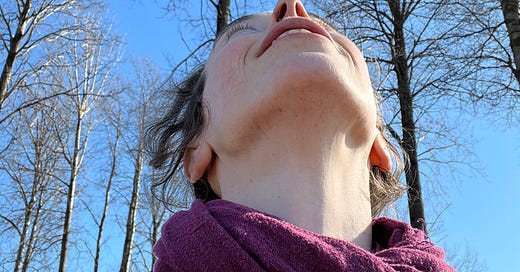I’ve had a rewrap with my writing this month. I think what brought it on was writing about shadow work, and how love and accept is the key for us to dare to approach that work. And it got me thinking; do I write in a way that encourages this love and accept? Or… do I write to try to tell you “what to do” - because I'm trying to tell myself what to do?
Hello Superego
It's our superego who’s in charge of telling us “what to do”. And as I described more in depth in my previous essay, I believe we can blame our superegos for why we begin splitting parts of our personality into shadows.
Our superego is concerned with how to manage ourselves in the meetings with our world. I believe that from the moment our brain is sufficiently developed, our superego takes notes on how our behavior is received by others. Then, superego starts reminding us on how to be and behave to ensure that we – according to our previous experiences – will gain as much love and acceptance from our environment as possible.
Because it's constantly pushing us to orient ourselves after how to move in harmony with our environment, it could initially seem that our superego would assist us to grow into better persons.
But here comes the irony. Cause do we have any IDEA on how to really BE in order to relate harmonically with our environment? Or do we just have loads and loads of ideas of what we IN NO WAY can allow ourselves to do in our relating’s with our world?
My opinion is that our superego rarely makes us into better people. Instead, it tends to make us terrified of those parts of ourselves that we (based on our early personal experiences) fear will cause trouble with others: our anger, our greed, our competitiveness – even our sadness, our ambitions, our self-doubts. And without clue about what to really DO about these parts of ourselves, most of us begin (more or less unconsciously) to HIDE these unwanted aspects of our personality away from sight – away from both where we and our world will see them (or so we think at least).
I believe our shadows became shadows because we made a subconscious decision that neither ourselves nor our world could LOVE and accept these sides of ourself. Our shadows actually felt like TOO unflattering parts of ourselves to even exist! “I don’t like you” we said to these primal (and often wounded) parts of ourselves. “I don’t wanna be like this!” And then we pushed those parts of ourselves into the darkness of our subconscious mind – deeming them too bad to be included within our conscious sight.
That's a harsh decision to make!
To love is prerequisite for daring to see – and a tad of self-love can do wonders for shadow claiming!
You know how some say that love is the key to consciousness? Lately, I've come to find this statement as true. Because if we ever are to keep the full complexity of ourselves within conscious sight, I think we first need to learn to LOVE our complete and complex selves - all our murky, petty shadow sides included.
In one of the toughest periods of my personal reconstruction journey, I rescued myself with making my ability of self-love into a game: As my most dreaded unconscious patterns were exposed and all I wanted was to hate myself, what did it take for me to love on what I saw myself doing instead?
It was nothing easy about that game. But it might’ve been the most constructive game I’ve ever played.
Could I forgive myself for being more complex than “good”? Could I love myself no matter what?
THAT is real - and challenging - shadow work!
To love is prerequisite for daring to see. When we decide to love the most murky painful parts of us, our ego can begin daring to look our shadow patterns in the eye. Before that, acknowledging them is simply: Too dangerous.
And the funny thing is; When we decide to love and forgive ourselves no matter what - and refrain from judging or guilt tripping ourselves - our shadows often wander into daylight by themselves. And as they touch the light of our consciousness, everything… transform.
Now a beautiful thing happens: As we own previously rejected parts of ourselves and hold them within the embrace of our self-love, a war within us ceases. Allowing our primal instincts to exist as parts of US, our ego can now COOPERATE with those instincts, and negotiate with them how to move about – rather than being overthrown by them. Now, we get to CHOOSE how to act on our primal instincts.
That choice: Is the beginning of harmonious relating. I´ll explore that aspect of shadow work in another letter.

Wishing you a blessed week!
Ida




